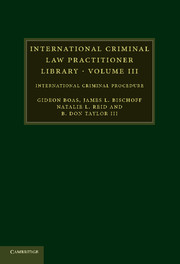Book contents
- Frontmatter
- Contents
- Foreword
- Table of authorities
- Table of short forms
- 1 The nature of international criminal procedure
- 2 Creation and amendment of rules of international criminal procedure
- 3 Procedures related to primacy and complementarity
- 4 Investigations, rights of suspects, and detention
- 5 Defence counsel, amici curiae, and the different forms of representation of accused
- 6 Pre-trial proceedings
- 7 Trial proceedings
- 8 The role and status of victims in international criminal procedure
- 9 Evidence
- 10 Judgement and sentencing
- 11 Appeal and revision
- 12 Conclusion
- Index
- References
7 - Trial proceedings
Published online by Cambridge University Press: 05 August 2011
- Frontmatter
- Contents
- Foreword
- Table of authorities
- Table of short forms
- 1 The nature of international criminal procedure
- 2 Creation and amendment of rules of international criminal procedure
- 3 Procedures related to primacy and complementarity
- 4 Investigations, rights of suspects, and detention
- 5 Defence counsel, amici curiae, and the different forms of representation of accused
- 6 Pre-trial proceedings
- 7 Trial proceedings
- 8 The role and status of victims in international criminal procedure
- 9 Evidence
- 10 Judgement and sentencing
- 11 Appeal and revision
- 12 Conclusion
- Index
- References
Summary
Trial is the central and most visible phase of an international criminal prosecution. In all the international criminal tribunals examined in this series, it is the public forum in which the prosecution and defence question witnesses, present documentary and other evidence, and make legal arguments before a panel of judges who serve as finders of both fact and law. Since the majority of accused before international criminal tribunals choose to contest the charges against them rather than plead guilty, most cases to date have featured a trial, and the trial has usually been lengthy. Rarely has a trial chamber completed a trial in under a year, and trials lasting two or more years are common. While the extended length of these trials has been criticised for potentially violating the rights of accused, the reasons for delays are complex. Delay often occurs as a result of the unavoidable confluence of a challenging political context, complex substantive law, a heavy caseload, and persistent scarcity of resources.
This chapter explores the trial phase of international criminal prosecutions, focusing on the ad hoc Tribunals, the ICC, and the SCSL. While differences exist in the trial procedures of these tribunals, trial before all of them is largely adversarial and the corresponding rules are similar in nature, and they will thus be discussed in tandem. Section 7.1 begins by looking at the process for appointing judges to a trial bench.
- Type
- Chapter
- Information
- International Criminal Law Practitioner LibraryInternational Criminal Procedure, pp. 250 - 302Publisher: Cambridge University PressPrint publication year: 2011



